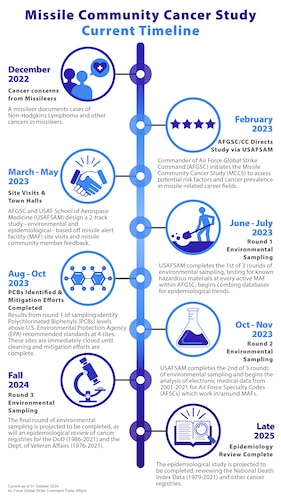AFGSC hosts Virtual Town Hall to discuss MCCS Phase 1B results
Air Force Global Strike Command held another public town hall Oct. 31 to discuss the results of the latest phases of the Missile Community Cancer Study (MCCS).
The town hall followed the release of Round 3 Environmental Sampling results at the command’s three active missile wings and the publication of the Phase 1B results of the ongoing Epidemiological Study, which included approximately twice as many records as Phase 1A, whose results were announced in June.
“The initial focus [of the study] was to make sure we understood the environment and to make sure we took care of our Airmen and their families,” said General Thomas A. Bussiere, commander of AFGSC, speaking to the environmental sampling efforts that began last summer.
The next step, he said, was to investigate the potential impact of service in the missile fields for veterans.
“The study also is intending on understanding the scope of the exposure since 1976 to today and developing institutional processes that can account and record exposure,” he said.
Round 3 of the Environmental Sampling effort discovered traces of volatile organic compounds in a small number of air samples, all of which were significantly below action levels set by the Occupational Health and Safety Administration. The three rounds of environmental sampling took place at every active Launch Control Center and Missile Alert Facility in AFGSC
Epidemiological Study Interim Results
The Town Hall focused on Phase 1B results of the Epidemiological study, which was discussed by the AFGSC Command Surgeon, Col. Gregory Coleman, and the U.S. Air Force School of Aerospace Medicine (USAFSAM) Chief of Aerospace Medicine, Col. Anthony Waldroup. Phase 1B included medical records from the Department of Veterans Affairs and the Department of Defense Cancer Registry, with data going back to 1976. The larger data set included nearly 11 times more cancer cases than Phase 1A, which looked at DOD military records from 2001 to 2020.
Fourteen individual cancer types were included in the study. Several key results stood out from the Phase 1B analysis.
- For three of the cancers (lung/bronchus, prostate and bladder), missile community members had a statistically significant lower incidence of cancer compared with the rest of the active force. For 11 cancers, missile community members had no statistically significant differences in rates of the cancers compared with other active-duty Air Force.
- Compared with the U.S. general population, the missile community had statistically significant lower incidence of 11 types of cancer, and for cancers as a whole.
- These results run counter to initial findings from Phase 1A, which suggested that missile community members might be experiencing higher incidence of breast and prostate cancer. That increased incidence was not found in the larger data set for Phase 1B.
However, the study team emphasized that Phase 2 of the Epidemiological Study will include an even larger data set.
“The study team anticipates finding two to three times more cancers in Phase 2 using the virtual pooled registry,” Waldroup said, referring to the combined data of various U.S. state and territory cancer registries. “No definitive conclusion should be drawn until Phase 2 is complete and all data sources have been incorporated.”
Health Considerations for Community Members
Following the discovery of polychlorinated biphenyls (PCBs) during the Environmental Sampling portion of the MCCS, AFGSC produced a memorandum for servicemembers who have served in the Launch Control Centers and Missile Alert Facilities, documenting the presence of known hazards in their work areas and alerting both medical providers and Veterans Affairs officials of likely exposure to these chemicals.
Waldroup encouraged community members to be proactive with both the memorandum and their conversations with medical providers. During periodic health assessments, servicemembers can list specific concerns they have regarding their health risks or potential exposures, and these concerns become a part of the permanent medical record.
Coleman added that former service members can do the same with the memorandum, which can be downloaded from the MCCS website and provided to non-military medical providers and Veterans Affairs officials.
Way Ahead
USAFSAM expects to complete Phase 2 of the Epidemiological Study toward the end of 2025, according to Waldroup. Phase 1C results will be released in the interim, as will the results of additional PCB remediation efforts.
Bussiere reiterated the need for transparency and trust as part of the MCCS, particularly in light of previous studies that were not as thorough.
“I sense in the community writ large that there is some skepticism based on the results of the 2001 and 2005 reports,” he said. “I share, and I've been very vocal about my unsatisfaction, with those two reports.
“But this study, this effort, and this energy is significantly more focused and engaged than those two times, and some of it's because you have a MAJCOM commander pushing on this. But there is no organization in the Department of the Air Force that is better postured or prepared or has the professional competencies to do this than USAFSAM. There isn't.”
More information about VA toxic exposure screenings can be found at their website: https://www.va.gov/resources/the-pact-act-and-your-va-benefits/.




